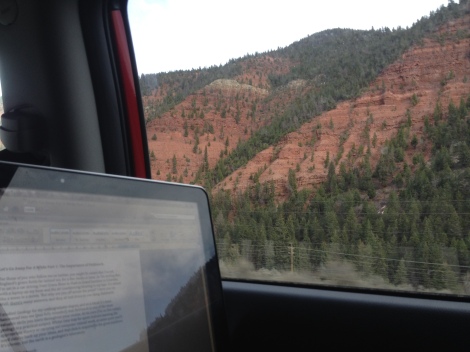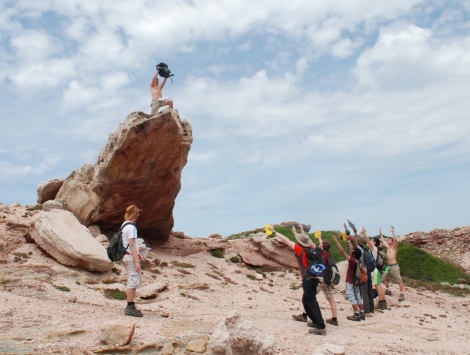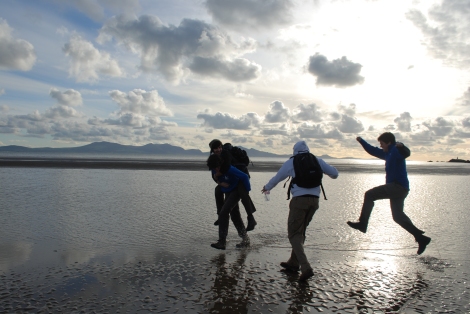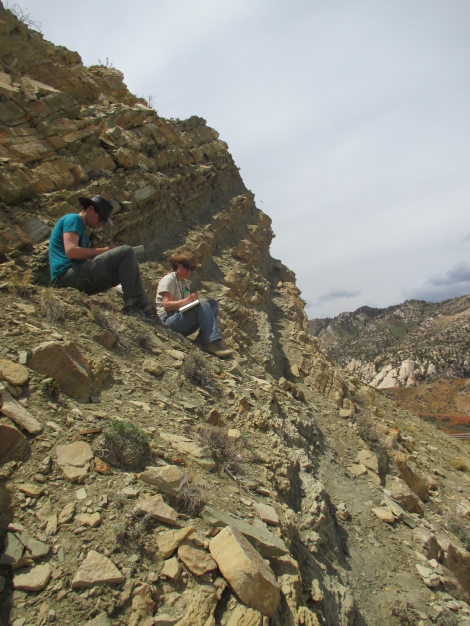For those of you who follow me on twitter, you might be aware that I’ve left England’s green fields far behind me, for a few weeks at least. I’m writing this from my car whilst driving from Utah to Colorado, with a laptop on my knee and the air conditioning blowing in my hair (Well, actually I’m now back in the UK, but we’ll keep that between us okay? – Ed). It’s almost like a scene from a movie. ‘But why are you off across the pond?’ I hear you cry. Well, there are many answers, and they all boil down to one thing: fieldwork.
I studied Geology for my undergraduate degree, and so it’s been hammered into me (pun fully intended) that fieldwork is one of the most valuable skills you learn throughout your course. At its core (I’m on fire today), geology is a practical subject. Whilst time may be spent learning the appropriate theory or carrying out computer related work, at some point you’ll need data to back up your ideas. When studying geology, that data is often acquired in the great outdoors. It’s cheesy, but the earth the greatest laboratory a scientist could have, and geologists have the privilege of using it.
There are several obvious reasons an earth scientist might decide to carry out fieldwork. The first is something I’ve already mentioned, and that’s data collection. Be it investigating flow directions of ancient deltas, measuring the gas output of volcanoes or digging for dinosaurs, fieldwork provides the primary data which forms the basis for scientific study.
Another possibility is scoping out an area scouting for locations. Finding the appropriate places to collect data from is just as important as data collection itself. If you’ve chosen the wrong age of rock or type of environment for the question that you’re asking then any conclusions you draw are going to be incorrect. Making sure you’ve got a good idea of the exposure in the area is an important first step.
Something that that links closely with this is mapping. Geological maps are resources that show the type and age of rocks in an area. Creating a geological map is right of passage in any UK undergraduate geology student, and for good reason. It’s an important skill: it draws together your geological knowledge, and provides an excellent resource for future earth scientists who are intending to carry out research in that location.

Snapshot of a geological map of part of Pennyslyvania. Source
So those are some of the primary reasons that someone might decide to carry out fieldwork. But in an electronic age where vast quantities of information are available online are these reasons are becoming invalid? What is the real importance of fieldwork?
It allows you to look at what you’re working on in real life and put theory and ideas into a context. Seeing rock in the field will allow you to make a judgment call on what you already know about the area, and whether you trust that information or not. For me, I’ve now reached a stage in my project where I have ideas that I’m keen to test (I’ll talk more about this in my next few posts) and questions that I want to ask. I’ve mentioned before that my project is looking at bias and biodiversity in epicontinental seas using the Western Interior Seaway as a case study. Whilst I’ve read about the formations and fossils which are found within the WIS, it’s got to the point where I have to see the rocks up close and personal so I can see if my ideas are feasible.
It allows you to spot things relevant to your work that other people might have missed. There’s no denying that there’s a vast literature base of geological work that covers almost every corner of the globe. Whatever area you’re working on, it’s more than likely that it has been written about somewhere. There’s a finite amount of rock exposure in the work, and a multitude of people working on it! Yet an often overlooked fact is that whilst field research is supposed to be an objective exercise, researchers are looking for data specific to their work. Invertebrate workers won’t be interested in vertebrate remains, and vertebrate workers won’t be interested in invertebrate occurrences. A sedimentologist wouldn’t have time for either! As a result some data gets overlooked, so it’s important to double check the work that people have carried out before. After all, one man’s trash is another’s treasure!
It allows time to think. This is a point that I feel can be sorely undervalued. Academic life can be hectic and intense. When not working on research, there’s a wide variety of tasks that grad students and researchers carry out each day. Between admin, teaching and marking there’s little time to sit and actually think about your work and where it’s headed. Fieldwork gets you away from that and allows you to contemplate your research in an unhurried, but focused manner. It’s often said that taking a break from work allows you to come back with a clear head and fresh ideas. I’ve found that fieldwork provides a similar experience. During the time I was in the field, I had more ideas how to frame my research and potential papers to write than through many of the months beforehand.
It forges great connections between people. It’s a bit of a fun one to end on, but that doesn’t make it any less true! Spending time in the field with someone is a great way to get to know them in both an academic and social setting. It’s a shared experience that often goes hand in hand with the ‘work hard, play hard’ attitude to generate a great sense of community. I’ve made some really great friendships whilst carrying out fieldwork, and I’m sure that I’ll continue to do so in the future.
So that’s it for why I think fieldwork is important. Over the coming weeks I’ll be telling you about my experiences planning fieldwork, carrying out my work as well as reporting on some of the cool things I saw along the way.
Today’s post’s title is based off the title of this song, and the lyrics of this one.





Great to hear about your trip, Chris, looking forward to reading more. Love the geology map. I hope you weren’t driving and blogging at the same time. Even with cruise control I can’t think that’s a good idea 🙂
LikeLike